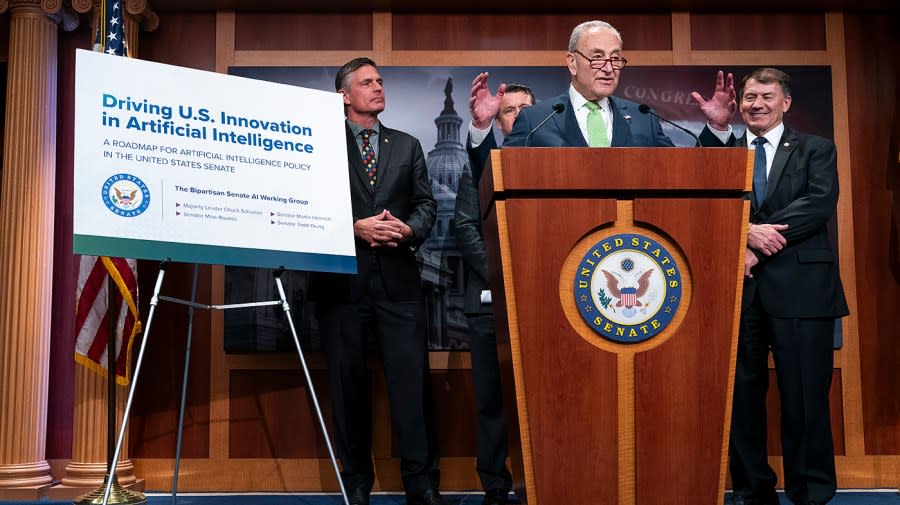Election-related AI bills test bipartisan support for regulation

- Oops!Something went wrong.Please try again later.
Two bills aimed at regulating how artificial intelligence (AI) is used in elections advanced out of a Senate panel Wednesday along party lines, posing a test for how lawmakers can come together across the aisle to pass regulations on the evolving technology.
Democrats on the Senate Rules Committee voted to advance two election-related AI bills opposed by most Republicans on the committee just hours after Senate Majority Leader Chuck Schumer’s (D-N.Y.) bipartisan AI working group released its long-awaited AI roadmap.
Wednesday’s debate around the election bills highlights how a partisan divide could hamper efforts to regulate AI despite bipartisan support for setting rules for the new techology and boosting funding for domestic innovation.
The committee voted on three bipartisan bills led by Committee Chair Amy Klobuchar (D-Minn.): the Preparing Election Administrators for AI Act, the AI Transparency in Elections Act, and the Protect Elections from Deceptive AI Act. Only the first, which would require the Election Assistance Commission to issue guidelines to help election administrators address AI’s impact on elections, advanced with bipartisan support from the committee.
The other two — one that would ban the use of deceptive AI in political ads, and another thatwould require disclaimers on political ads with AI generated content — faced opposition from most Republicans on the committee despite having GOP co-sponsors.
Senate Republican Leader Mitch McConnell (R-Ky.), argued they could “tamper” with a “well-developed legal regime” to take down false adds and “create new definitions that could reach well beyond deepfakes.”
The GOP opposition to bills with bipartisan support indicates a rocky road ahead to pass significant AI regulation in a split Senate, where those bills will likely require 60 votes to pass with filibuster rules in place.
“It’s hard. We all know partisanship is endemic around here, but the four of us are dedicated to working with our colleagues to deal with this issue in every way that we can,” Schumer said at a press conference Wednesday about the roadmap, alongside Sens. Mike Rounds (R-S.D.), Martin Heinrich (D-N.M.) and Todd Young (R-Ind.).
The AI Roadmap does not call for or back specific legislative proposals, but rather includes guidance and recommendations for how committees and private industry can make changes to mitigate AI risks and maximize its benefits.
The roadmap highlights elections and democracy as a priority area and “encourages the relevant committees and AI developers and deployers to advance effective watermarking and digital content provenance as it relates to AI-generated or AI-augmented election content.”
But it stops short of backing specific bills, like the ones that advanced Wednesday.
“We did find areas of bipartisan agreement as it relates to election in the report, but we want the committees of jurisdiction to work, as I understand they are in this case, to work through a bipartisan committee process to consider these various bills. But we didn’t endorse any specific election bills,” Young said.
The report was created after a series of AI Insight Forums convened by Schumer and the bipartisan working group with tech CEOs, researchers and civil rights leaders to consider AI risks and benefits.
It’s been nine months since the first forum, featuring OpenAI CEO Sam Altman, X owner and Tesla CEO Elon Musk, Google CEO Sundar Pichai, Microsoft CEO Satya Nadella and Meta CEO Mark Zuckerberg, was held. Senators are now running up against an approaching election as they look to build on the report to advance and pass legislation.
Schumer said the goal is to move forward on legislation, including the bills that advanced Wednesday and others that emerge from committee discussions, quickly.
“I believe a good number of them will come out with bipartisan legislation that we can pass — not all of them — but that we can pass before the end of the year,” Schumer said.
He said the U.S. should not “rush this as some other countries have done and then had to backtrack.”
“We have to have some humility as well as urgency. So we’re very hopeful that we’ll get some legislation passed,” he added.
For the latest news, weather, sports, and streaming video, head to The Hill.

